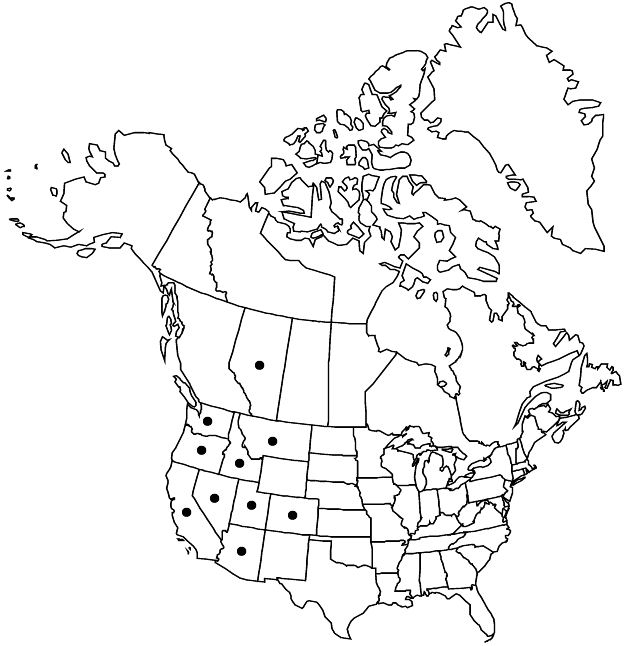Potentilla jepsonii
J. Bot. Res. Inst. Texas 2: 202. 2008.
Stems decumbent to nearly erect, (0.2–)0.5–2.6 dm. Basal leaves subpinnate to subpalmate, 1.5–10(–17) cm; petiole 0.5–4(–8) cm, long hairs ± abundant, spreading to loosely appressed, 0.5–2 mm, weak to stiff, short hairs absent or sparse, cottony or crisped hairs absent, glands sparse to abundant; leaflets (1–)2–3 per side, on distal 1/6–1/3(–1/2) of leaf axis, separate to slightly overlapping, terminal ones oblanceolate-elliptic to narrowly obovate, (0.5–)1–2.5(–3.5) × 0.4–1(–1.3) cm, margins strongly revolute, incised 3/4+ to midvein, undivided medial blade 1.5–3(–5) mm wide, teeth (2–)3–5(–6) per side, ± linear-elliptic to rarely ovate or oblanceolate, surfaces ± dissimilar, abaxial ± grayish, rarely white, long hairs ± abundant especially on veins, 1 mm, weak, short hairs absent or sparse, cottony hairs absent, crisped hairs sparse to abundant, glands ± abundant, sometimes obscured, adaxial green to gray-green, long hairs sparse to abundant, loosely appressed, 0.5–1(–2) mm, short hairs absent or sparse, cottony and crisped hairs absent, glands ± abundant. Cauline leaves 1–2. Inflorescences (1–)3–12(–20)-flowered, congested, scarcely opening in fruit. Pedicels 0.2–0.5 cm (proximal to 1.2 cm). Flowers: epicalyx bractlets elliptic to linear, 1.5–3 × (0.3–)0.5–1.2 mm, lengths 1/2–3/4 times sepals, margins flat; hypanthium 2.5–5 mm diam.; sepals 2–5 mm, apex usually ± acute to obtuse, rarely acuminate, abaxial surfaces: venation faint, glands abundant, evident; petals pale yellow, 2–5 × 2–4 mm, lengths ± equal to sepals; filaments 0.5–2 mm, anthers 0.3–0.7 mm; carpels 20–60, styles papillate-swollen in proximal 1/2–3/4+, 0.8–1.2 mm. Achenes 1 mm, smooth to faintly rugose.
Phenology: Flowering summer.
Habitat: Seasonally moist sites in alpine meadows, ridges, fellfields, rock ledges, talus slopes
Elevation: 2500–3700 m
Distribution

Alta., Ariz., Calif., Colo., Idaho, Mont., Nev., Oreg., Utah, Wash.
Discussion
Potentilla jepsonii (a replacement name for P. pensylvanica var. ovium) is widespread at higher elevations in the Intermountain Region, extending into the Sierra Nevada in California and the Rocky Mountains in Idaho and Wyoming. Disjunct occurrences are known on the north rim of the Grand Canyon and San Francisco Peaks, Arizona, and Steens Mountain, Oregon. Collections have most commonly been included in P. pensylvanica (for example, B. Ertter 1993; N. H. Holmgren 1997b); they differ in leaf division, vestiture, and epicalyx bractlets. J. Soják considered var. ovium to be a variety of P. litoralis, which has comparable leaves and vestiture; P. jepsonii lacks the enlarged, revolute epicalyx bractlets that distinguish P. litoralis and is for the most part well separated geographically and elevationally. The exception is the montane phase of P. litoralis, which, at the current stage of knowledge, is somewhat arbitrarily delimited from P. jepsonii in the northern Rocky Mountains; collections from Waterton Lakes National Park in Alberta and the Okanogan Mountains in Washington are tentatively placed here in P. jepsonii.
Selected References
None.